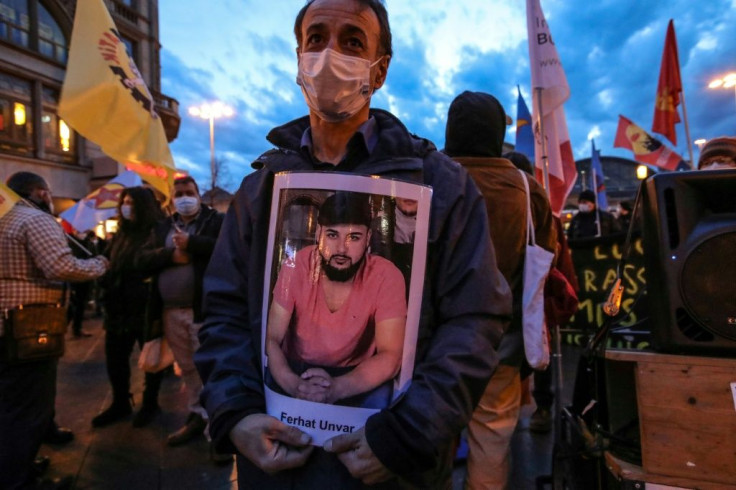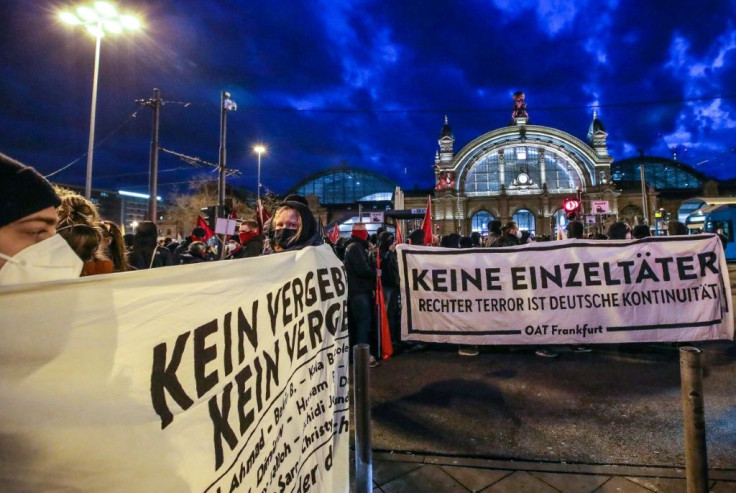Germany Seeks Answers A Year After Deadly Racist Shooting
A year after nine people were killed in a racist shooting in the German city of Hanau, President Frank-Walter Steinmeier on Friday urged all Germans to unite against far-right extremism.
"Has the sadness gone? Has the pain subsided, the anger gone? Have all questions been answered? No. Absolutely not," Steinmeier told around 50 people gathered at an event in Hanau's Congress Park, scaled down due to Covid-19 restrictions.
"But as federal president I ask you: Let us not allow this evil act to divide us," he said.
The deadly shooting at a shisha bar and a cafe on February 19, 2020 shocked Germany and fuelled fears over far-right terror.
Gunman Tobias Rathjen, 43, completed his killing spree by turning the gun on his mother and himself, leaving behind a 24-page "manifesto" of right-wing extremist views and conspiracy theories.
But 12 months on, victims' relatives say too little has been done to shed light on what happened and ensure that such atrocities will not be repeated.
Steinmeier said processing the events of the past was "the state's duty to the public and above all to the relatives of the victims", who he described as "people who live among us, who belong to us, to our city and our neighbourhood".

An investigation into what happened is still ongoing, with many questions unanswered and little known about the attacker.
Edgar Franke, the government commissioner for the victims of terrorism, pleaded this week for closure for the friends and families of those slain.
"There can be no public criminal trial against a dead attacker in which the victims can ask questions. This makes it all the more important to fully clarify the background," he tweeted.
Rathjen lived with his parents in Hanau. He was a sports shooter and legally owned several weapons, but was not known to police.
In November 2019, however, he had filed a criminal complaint about a "secret service organisation" which he accused of "tapping into people's brains" in order to "control world events".

In 2002, he was diagnosed with paranoid schizophrenia, which apparently remained untreated.
Relatives of the victims have lately focused their attentions on Rathjen's father, who they believe was partly responsible for the crime.
They have filed a 16-page criminal complaint against the 73-year-old for being an accessory to murder, according to a report in the daily Sueddeutsche Zeitung.
They believe he had a controlling relationship with his son, knew about plans for the attack and encouraged it.
The families have also criticised the police response on the night of the attack, complaining the emergency number was busy and they could not get through.
They also say the emergency exit of the bar at the second crime scene had been locked on police orders.
So far, a total of 42 family members of the victims have received about 1.2 million euros ($1.5 million) in compensation from the federal government, with more potentially in the pipeline, according to the justice ministry.
Organisations across Germany called for decisive action against racism and right-wing extremism ahead of the anniversary of the attack on Friday.
"For those affected, Hanau is potentially (still) everywhere, all the time," Atila Karaborklu, chairman of the TGD Turkish community association, said in a statement.
Aiman Mazyek, president of the Central Council of Muslims, also called for better protection against racist attacks.
"We need an even clearer awareness in the interior ministries that right-wing extremist attacks, for example on Muslims, are not an abstract danger, but a concrete one," he told the Neue Osnabruecker newspaper.
Chancellor Angela Merkel had noted the upcoming anniversary in her weekly podcast at the weekend, saying: "Racism is a poison. Hate is a poison."
© Copyright AFP {{Year}}. All rights reserved.





















